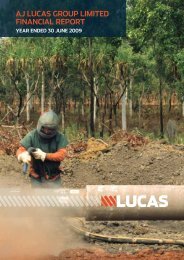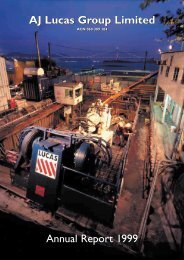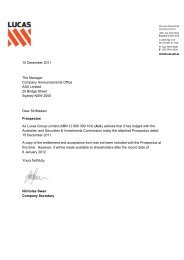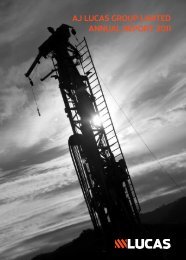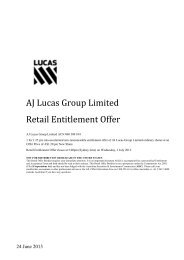AJ Lucas Group annual report 2007-08
AJ Lucas Group annual report 2007-08
AJ Lucas Group annual report 2007-08
Create successful ePaper yourself
Turn your PDF publications into a flip-book with our unique Google optimized e-Paper software.
Indemnification and insurance<br />
of officers and auditors<br />
Indemnification<br />
The Company has agreed to indemnify all directors and officers of the<br />
Company against all liabilities including expenses to another person or<br />
entity (other than the Company or a related body corporate) that may arise<br />
from their position as directors or officers of the <strong>Group</strong>, except where the<br />
liability arises out of conduct involving a lack of good faith.<br />
No indemnity has been provided to the auditors of the Company.<br />
Insurance premiums<br />
Since the end of the previous financial year, the Company has paid premiums<br />
in respect of Directors’ and Officers’ liability and legal expenses insurance<br />
contracts for the year ended 30 June 20<strong>08</strong> and, since the end of the<br />
financial year, the Company has paid or agreed to pay premiums in respect<br />
of Directors’ and Officers’ insurance for the year ending 30 June 2009.<br />
Non-audit services<br />
During the year, KPMG, the Company’s auditor, has performed certain<br />
other services in addition to their statutory duties.<br />
The Board has considered the non-audit services provided during the<br />
year by the auditor and in accordance with written advice provided by<br />
resolution of the audit committee, is satisfied that the provision of those<br />
non-audit services during the year by the auditor is compatible with,<br />
and did not compromise, the auditor independence requirements of the<br />
Corporations Act 2001 for the following reasons:<br />
• all non-audit services were subject to the corporate governance<br />
procedures adopted by the Company and have been reviewed by<br />
the audit committee to ensure they do not impact the integrity and<br />
objectivity of the auditor; and<br />
• the non-audit services provided do not undermine the general<br />
principles relating to auditor independence as set out in APES 110<br />
‘Code of Ethics for Professional Accountants’, as they did not involve<br />
reviewing or auditing the auditor’s own work, acting in a management<br />
or decision-making capacity for the Company, acting as an advocate<br />
for the Company or jointly sharing risks and rewards.<br />
Payments to the auditor of the Company, KPMG, and its related practices for<br />
non-audit services provided during the year, as set out in note 5 in the notes<br />
to the financial statements, amounted to $353,701 (<strong>2007</strong>: $92,939).<br />
Lead auditor’s independence declaration<br />
The Lead auditor’s independence declaration is set out on page 29 and forms<br />
part of the Directors’ Report for the financial year ended 30 June 20<strong>08</strong>.<br />
Rounding off<br />
The Company is of a kind referred to in ASIC 98/100 dated 10 July 1998<br />
and, in accordance with that Class Order, amounts in the Directors’ Report<br />
and the financial <strong>report</strong> are rounded off to the nearest thousand dollars,<br />
unless otherwise stated.<br />
Remuneration <strong>report</strong> - audited<br />
This remuneration <strong>report</strong>, which forms part of the Directors’ Report,<br />
outlines the remuneration policy for directors and senior management of<br />
the Company and the <strong>Group</strong>.<br />
Remuneration philosophy<br />
The key principle of the Company’s executive remuneration policy is<br />
to set remuneration at a level that will attract and retain qualified and<br />
experienced personnel and motivate and reward them to achieve strategic<br />
objectives and improve business results.<br />
Remuneration is structured to reward employees for increasing<br />
shareholder value. This is achieved by providing a fixed remuneration<br />
component together with short and long term performance-based<br />
incentives.<br />
Through creating goal congruence between directors, executives and<br />
shareholders, it is hoped to maximise shareholder value.<br />
<strong>AJ</strong> <strong>Lucas</strong> aims to set fixed <strong>annual</strong> remuneration at market median<br />
levels for jobs of comparable size and responsibility using established job<br />
evaluation methods and to provide incentives to enable top performers<br />
to be remunerated at the upper end of the market, subject always to the<br />
performance of the <strong>Group</strong>.<br />
The aim of the incentive plans is to drive performance to successfully<br />
implement <strong>annual</strong> business plans and increase shareholder value.<br />
The remuneration for executives and staff is reviewed <strong>annual</strong>ly,<br />
using a formal performance appraisal process and market data derived<br />
from independent surveys of people with similar competencies and<br />
responsibilities.<br />
Remuneration structure<br />
Remuneration packages include a mix of fixed and variable remuneration<br />
and short and long-term incentives.<br />
Fixed remuneration<br />
Fixed remuneration consists of base remuneration which is calculated<br />
on a total cost basis and includes any fringe benefit tax charges related<br />
to employee benefits including motor vehicles as well as employer<br />
contributions to superannuation.<br />
Incentive based remuneration<br />
Incentive based remuneration includes short-term and long-term incentives<br />
and is designed to reward executive directors and senior executives for<br />
meeting or exceeding their financial objectives.<br />
All incentive remuneration is subject to the <strong>Group</strong> achieving certain<br />
performance criteria including most importantly a minimum level of profit.<br />
Subject to these performance criteria being met, the short-term incentives<br />
(STI) may be received as cash or ordinary shares in the Company subject to<br />
a minimum percentage being taken in shares. The STI shares vest in equal<br />
tranches at the end of each of the first and second year after being granted.<br />
The long-term incentive (LTI) is only available to be taken in ordinary<br />
shares and vests after three years subject to the recipient still being<br />
employed by the <strong>Group</strong> at that time.<br />
Relationship of remuneration<br />
to company performance<br />
In considering the <strong>Group</strong>’s performance and benefits for shareholder<br />
wealth, executive management has regard to the following indices in<br />
respect of the current financial year and the previous two financial years.<br />
30 Jun 20<strong>08</strong> 30 Jun <strong>2007</strong> 30 Jun 2006<br />
Revenue ($’000) $424,301 $216,369 $171,232<br />
Net profit attributable<br />
to equity holders of the $13,468 $6,396 $3,030<br />
Company ($’000)<br />
Earnings per share 24.5¢ 11.9¢ 5.9¢<br />
Dividend per share 6.0¢ 0.0¢ 0.0¢<br />
Share price at balance date $6.27 $2.00 $0.87<br />
Share price appreciation 314% 230% (32.6)%<br />
The overall level of key management personnel compensation takes into<br />
account the performance of the <strong>Group</strong> over a number of years. Over the<br />
past four years, the <strong>Group</strong>’s profit from ordinary activity after income tax<br />
has grown at an average rate per annum of over 79%. During the same<br />
period, the average increase in key management’s compensation has<br />
grown by approximately 12% per annum.<br />
a year of milestones 23



